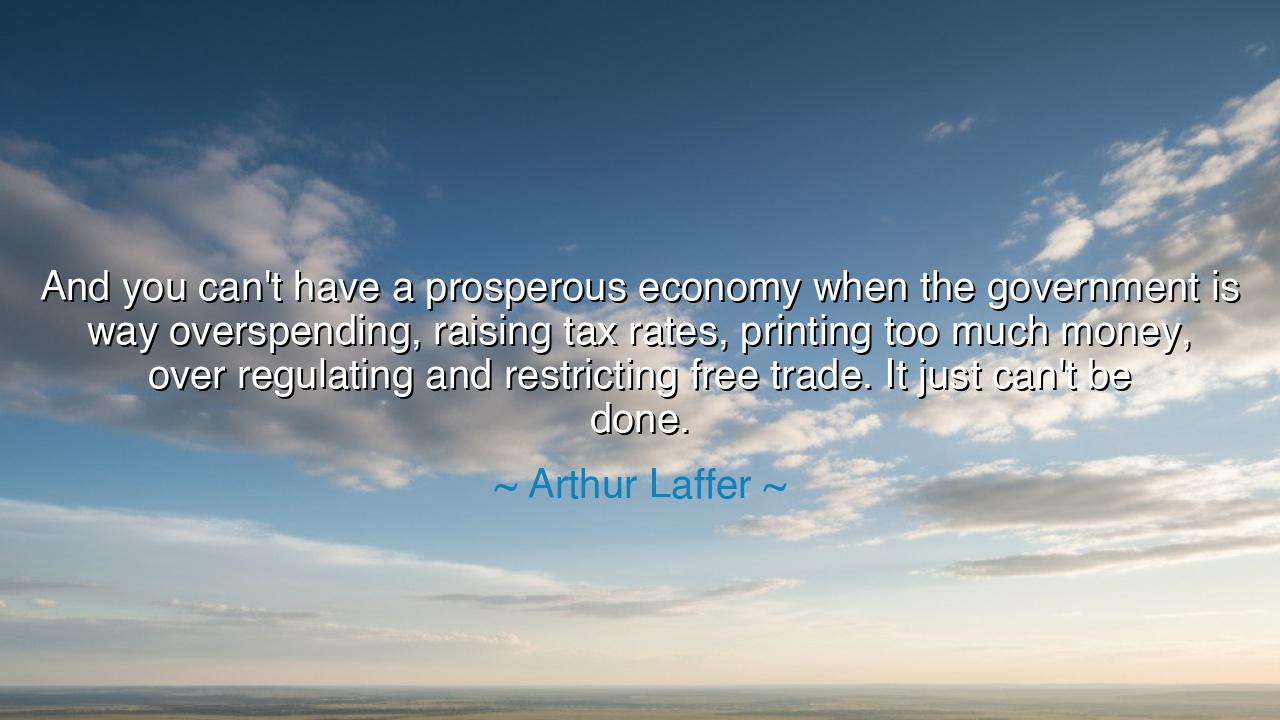
And you can't have a prosperous economy when the government is
And you can't have a prosperous economy when the government is way overspending, raising tax rates, printing too much money, over regulating and restricting free trade. It just can't be done.






“And you can’t have a prosperous economy when the government is way overspending, raising tax rates, printing too much money, over regulating and restricting free trade. It just can’t be done.” Thus spoke Arthur Laffer, an economist whose name became a banner for the philosophy of growth through freedom. His words are not merely the dry echo of fiscal policy, but a warning forged from history — a reminder that prosperity cannot thrive under the weight of excess. He speaks as one who has seen the delicate machinery of nations, and knows that when government grows swollen and hungry, the spirit of enterprise grows thin and weak. His voice, like that of a sage in the marketplace, calls the people to remember an ancient truth: that wealth, like liberty, perishes when power seeks to command it too tightly.
The heart of Laffer’s teaching lies in balance — the balance between governance and freedom, between order and initiative. He warns against overspending, that subtle temptation by which governments seek to buy favor or solve every problem through coin. For when rulers spend beyond their means, they do not create wealth — they borrow it from the future. And when the burden grows unbearable, it is the common citizen who must pay the price. So too with taxation, for when the state takes too much, it drains not only gold but also the courage to create. The wise ruler, Laffer teaches, must know when to restrain the hand of power, lest it strangle the very economy it hopes to nurture.
History, ever the stern teacher, has proven these truths in blood and ruin. Consider the fate of the once-mighty Roman Empire. As Rome expanded, her government became a devourer of gold. Bureaucrats multiplied, taxes rose upon the backs of farmers and craftsmen, and the empire began to print more and more currency to fill the gap. The silver in the denarius dwindled, inflation soared, and faith in Rome’s money collapsed. A people who had once conquered the world became enslaved to their own debt. In time, the legions could no longer be paid, and the empire crumbled from within. Thus, the overspending and overregulating of government, joined with the false magic of printed wealth, led to the fall of a civilization that once believed itself eternal.
Laffer’s insight came to life again in the late twentieth century, when nations across the world found themselves suffocating beneath stagnation. Heavy taxation, rigid regulation, and the printing of easy money had driven productivity to despair. It was then that Laffer rose to speak of a simple, yet profound truth: that human creativity flourishes best when it is trusted, not chained. The idea became known as the Laffer Curve — the understanding that beyond a certain point, higher taxes yield not greater revenue, but less, for they kill the very will to work. This idea helped ignite the era of renewal under leaders like Ronald Reagan and Margaret Thatcher, who dared to cut taxes, free trade, and let the engines of enterprise breathe once more. The result was not chaos, but revival — the sleeping spirit of innovation reawakened.
But Laffer’s warning endures beyond his age, for the temptation to overspend is eternal. Governments, like men, are easily lured by the illusion of control — believing they can shape the economy by decree, or conjure prosperity from the printing press. Yet every generation that yields to this illusion learns the same painful truth: wealth is not created by law, but by labor; not by compulsion, but by confidence. When freedom fades beneath the shadow of regulation and debt, the people’s ingenuity wanes, and nations decline not from weakness, but from suffocation.
Still, Laffer does not speak merely to kings or economists. His wisdom belongs also to the common heart. For each person governs a small economy — the household, the craft, the mind. Just as a nation must live within its means, so must the individual guard against waste and fear. Just as a state must allow its people to trade and create freely, so must each soul learn to give and receive in trust. Prosperity begins with discipline, both private and public; it is the fruit of responsibility wedded to liberty.
Therefore, let these words be remembered not as a warning only, but as a call to stewardship. A nation’s greatness lies not in the abundance of its treasury, but in the freedom of its people. Let government be strong, but not gluttonous; generous, but not indulgent. Let it defend the field, not plow it. And let the people, in turn, rise to their duty — to labor, to create, to dream — knowing that the soil of prosperity is tilled not by policy alone, but by the courage of the human spirit.
For a prosperous economy is not built by governments, but by free souls who are trusted to build their own destiny. Guard your freedom, limit your excess, and you shall find that abundance follows not from control, but from trust.






AAdministratorAdministrator
Welcome, honored guests. Please leave a comment, we will respond soon